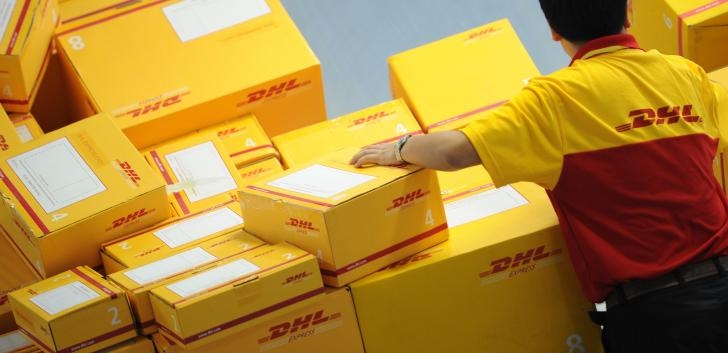International logistics firms en route to greener future
 |
| International logistics firms en route to greener future, Peter Parks/AFP/GettyImages |
DHL, which has been operating in Vietnam for over 20 years, is one of the firms trying to go greener and utilise more electric modes of transport.
“In Vietnam, we also have set the goal of reducing our carbon footprint to zero by 2050. This is our long-term plan and as such we are looking at how we can reduce our carbon emissions. We are looking into how we can further use machinery, big data, and automated processes to make our systems more energy-efficient,” Raymond Yee, vice president of DHL Express Asia-Pacific’s Customs and regulatory Affairs, told VIR.
“We produce our own electric vehicles and are looking at setting up an Asia-Pacific manufacturing plant. We are already making what we call e-scooters in Japan. We have a couple of innovation centres too, one in Europe and one in Singapore, to serve the region. We are constantly trying to enhance our systems in order to be at the forefront of these changes,” he added.
However, DHL is not the only logistics firm heading down the green track, as green logistics by rail have also been developing quickly.
NR Greenlines Logistics Co., Ltd., a joint venture between Railway Transport and Trade JSC (Ratraco) and Japan’s Nissin Group, is just one example of how efficient and ecological railway systems can be to the logistics industry.
“We have also built energy-saving systems in our offices and warehouses. We have plans to reduce the use of materials that do harm to the environment, and reuse materials and equipment to mitigate the volume of waste discharged into the environment,” said Nguyen Chinh Nam, chairman of NR Greenlines Logistics.
Lazada E-logistics Vietnam, which made its debut in late 2015, is also making moves in the same direction.
“We operate dozens of e-bicycles for delivery services and are planning to further develop this kind of vehicle, raising the number to several hundred by the end of 2018. We are studying investment opportunities in electrically-run three- and four-wheeler vehicles for distribution in the future,” said Vu Duc Thinh, country manager of Lazada E-logistics Vietnam.
“We have also invested in automated sorting systems, which use robots to sort the parcels. We have one in operation in Ho Chi Minh City and we are going to launch the second in Hanoi later this month. It is the very first auto-sorting system in Vietnam, with a capacity of tens of thousands of parcels per hour,” Thinh said.
What is currently happening at DHL, Lazada E-logistics, and NR Greenlines Logistics is an inevitable trend amongst powerful logistics firms, particularly given that accelerating developments are causing big threats to the environment.
The transport system and local environment in Vietnam are suffering much pressure as e-commerce undergoes a significant boom, and this is exacerbating the fact that the current logistics infrastructure does not hold adequate capacity to serve the growing e-commerce industry. Logistics companies now often use motorbikes and smaller trucks for their delivery services. However, motorbikes are not designed for delivery services, as they can only carry a limited volume, and each motorbike discharges a relatively high volume of carbon dioxide (CO2) per delivery.
As the logistics business grows, more motorbikes and trucks are likely to be used, meaning more pressure on traffic systems and more pollution threats to the environment.
According to Thinh, imagine the effects if Vietnam’s e-commerce market increases to $3.7 billion by 2020 as is expected, the pressure on the transport system and environment could be disastrous, particularly if the problem of weak e-commerce logistics development remains unsolved.Lazada E-logistics cited a recent survey by Momentum Works, stating that a motorbike
discharges 2.27 kilogrammes of CO2 per 45 kilometres, while the amount is just 0.238kg of CO2 for each e-bicycle, and 0.743kg of CO2 for an electrically-run three-wheeler vehicle.
E-commerce has been developing fiercely in Vietnam in recent years. In 2017, e-commerce retail sales expanded by a staggering 25 per cent against 2016. California-based business consulting firm, Frost and Sullivan, forecast that the scale of Vietnam’s e-commerce market will rise from $1.6 billion in 2016 to $3.7 billion by 2020.
What the stars mean:
★ Poor ★ ★ Promising ★★★ Good ★★★★ Very good ★★★★★ Exceptional
Related Contents
Latest News
More News
- MAE names big 10 policy wins in 2025 (February 06, 2026 | 08:00)
- US firms deepen energy engagement with Vietnam (February 05, 2026 | 17:23)
- Vietnam records solid FDI performance in January (February 05, 2026 | 17:11)
- Site clearance work launched for Dung Quat refinery upgrade (February 04, 2026 | 18:06)
- Masan High-Tech Materials reports profit: a view from Nui Phao mine (February 04, 2026 | 16:13)
- Hermes joins Long Thanh cargo terminal development (February 04, 2026 | 15:59)
- SCG enhances production and distribution in Vietnam (February 04, 2026 | 08:00)
- UNIVACCO strengthens Asia expansion with Vietnam facility (February 03, 2026 | 08:00)
- Cai Mep Ha Port project wins approval with $1.95bn investment (February 02, 2026 | 16:17)
- Repositioning Vietnam in Asia’s manufacturing race (February 02, 2026 | 16:00)

 Tag:
Tag:




















 Mobile Version
Mobile Version